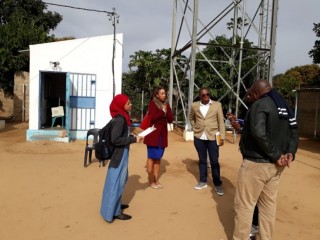Project Results:
Mobile Water Technology for Mozambique (2)
About the project
This project is a follow-up for the project Smart water meter reading in which a smart phone based water meter reading app in Moamba was developed and tested. Pictures of water meters were read by the app which converted data to the billing software. This follow-up funding covered a part for the overspending in the first project plus a new pilot in 3 decentral systems around Maputo.
The pilot was done to further develop the app and to test it with a new client, with high potential for sales. Apart from the reading-billing chain, the app is also very instrumental in the analysis of failures in the water distribution and tackling mis-information. Main aim was to have less non-revenue water, higher sales and more paying clients. The project ran from April 2018 to April 2019.
Main partners
MWM, Collins Ltd, FIPAG, 3 private operators with delegated management contract
For key results, tips for the future and potential for growth: check the main project
Location
Maputo, MozambiqueLast project updates
No updates yet
Background
Scaling water services across developing markets requires operators to implement low cost and efficient processes. Meter reading and billing are some of the most critical applications for water operators, as these influence the income of the utility directly. If one could speed-up and increase these incomes, the utility could use the financial means to tackle the Non-Revenue Water (NRW) problem in areas where rationing due to water scarcity is a common practice. Building on the deep insights of different markets, operators that demonstrate high quality of customer relationship management & billing processes tend to have a good payment ratio of their customers. Therefore, this project aims to scale-up the technology of Mobile Water Management from the initial pilot and adds more value to it by including house-to-house surveys, historical datasets and more optical character recognition (OCR) technology as validation tools and assessments of water consumption per customer.
Target group
The pilot will take place in an area which is managed by FIPAG. This partner is interested in methods to increase efficiency in metering and billing and wants to explore possibilities of the app as a tool for multiple data acquisition in order to tackle Non Revenue Water problems.
Overview of Goals
The main goal of the project is to offer a low-cost accurate water meter reading solution (meter reading using an application designed for smartphones), which contributes increased data accuracy and also offers water utilities new insights in their system through different types of data collection. These insights could lead to considerable cost savings in metering/billing, administration procedures and system maintenance. It might also contribute to the empowerment of the sociotechnically less privileged (women).
